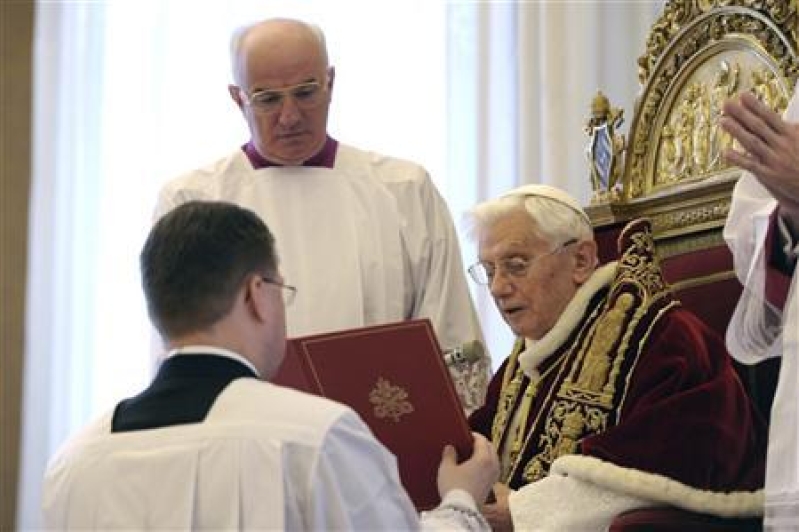
Pope Benedict XVI said in an announcement on Monday that he no longer had the mental and physical strength to run the Roman Catholic Church, and will resign from Papacy as of Feb. 28th.
Benedict, 85, emphasized that carrying out the duties of being pope — the leader of more than a billion Roman Catholics worldwide — requires “both strength of mind and body.”
“After having repeatedly examined my conscience before God, I have come to the certainty that my strengths due to an advanced age are no longer suited to an adequate exercise of the Petrine ministry,” he told the cardinals. “I am well aware that this ministry, due to its essential spiritual nature, must be carried out not only by words and deeds but no less with prayer and suffering.
“However, in today’s world, subject to so many rapid changes and shaken by questions of deep relevance for the life of faith, in order to govern the barque of St. Peter and proclaim the Gospel, both strength of mind and body are necessary — strengths which in the last few months, has deteriorated in me to the extent that I have had to recognize my incapacity to adequately fulfill the ministry entrusted to me.”
At 78, the German Cardinal Joseph Ratzinger became Pope in 2005 after John Paul II’s death, and was one of the oldest new popes in history when elected. He took the helm as one of the fiercest storms the Catholic Church has faced in decades – the scandal of child sex abuse by priests – was breaking.
Georg Ratzinger, the Pope’s brother, said his brother had pondered about this decision for months amid ailing health. He said that the doctor has advised the Pope not to take any more transatlantic trips and was having increasing difficulty walking.
The resignation was unexpected – surprising governments, Vatican-watchers, and even his closest aids.
A Vatican spokesman, Father Federico Lombardi, said that even Pope Benedict’s closest aids did not know what he was planning to do and were left “incredulous”. He added that the decision showed “great courage” and “determination.”
He is the also first Pope in 600 years to resign.
The Catholic Church’s governing code, Canon Law, states that the only conditions for the validity of such as resignation are that it be made freely and be properly published.
But resignation is extremely rare: the last Pope to step aside was Pope Gregory XII, who resigned in 1415 amid a schism within the church.
In an interview conducted in 2010 about his book “Light of the World”, Benedict raised the possibility of resigning if he were simply too old or sick to continue on in 2010.
“If a pope clearly realizes that he is no longer physically, psychologically and spiritually capable of handling the duties of his office, then he has a right, and under some circumstances, also an obligation to resign,” Benedict said.
The Pope is not expected to take part in the conclave that will choose his successor in mid-March, and will then retire to the papal residence at Castel Gandolfo when he leaves office.
Father Lombardi said the Pope would then move into a renovated monastery used by cloistered nuns inside the Vatican, for "a period of prayer and reflection".
Below, the full text of the pope’s resignation announcement:
“Dear Brothers,
I have convoked you to this Consistory, not only for the three canonizations, but also to communicate to you a decision of great importance for the life of the Church. After having repeatedly examined my conscience before God, I have come to the certainty that my strengths, due to an advanced age, are no longer suited to an adequate exercise of the Petrine ministry. I am well aware that this ministry, due to its essential spiritual nature, must be carried out not only with words and deeds, but no less with prayer and suffering. However, in today’s world, subject to so many rapid changes and shaken by questions of deep relevance for the life of faith, in order to govern the barque of Saint Peter and proclaim the Gospel, both strength of mind and body are necessary, strength which in the last few months, has deteriorated in me to the extent that I have had to recognize my incapacity to adequately fulfill the ministry entrusted to me. For this reason, and well aware of the seriousness of this act, with full freedom I declare that I renounce the ministry of Bishop of Rome, Successor of Saint Peter, entrusted to me by the Cardinals on 19 April 2005, in such a way, that as from 28 February 2013, at 20:00 hours, the See of Rome, the See of Saint Peter, will be vacant and a Conclave to elect the new Supreme Pontiff will have to be convoked by those whose competence it is.
Dear Brothers, I thank you most sincerely for all the love and work with which you have supported me in my ministry and I ask pardon for all my defects. And now, let us entrust the Holy Church to the care of Our Supreme Pastor, Our Lord Jesus Christ, and implore his holy Mother Mary, so that she may assist the Cardinal Fathers with her maternal solicitude, in electing a new Supreme Pontiff. With regard to myself, I wish to also devotedly serve the Holy Church of God in the future through a life dedicated to prayer.”







